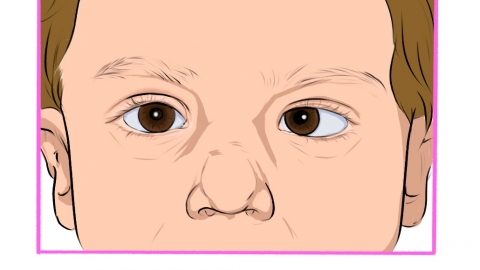What are the causes of strabismus in children?
Generally, childhood strabismus may be caused by underdeveloped visual function, bad eye habits, refractive errors, congenital abnormalities of the extraocular muscles, or paralytic strabismus. It is recommended to seek timely medical consultation to determine the cause and receive appropriate treatment under a doctor's guidance. A detailed explanation is as follows:

1. Underdeveloped visual function: In children, the binocular single vision function may not be fully matured, resulting in poor coordination of the extraocular muscles and a tendency to develop strabismus, which often occurs within six months after birth. Regularly monitor the child's eye condition, avoid prolonged near-distance viewing, and promote the development of binocular visual function.
2. Bad eye habits: Prolonged close-up viewing of electronic devices or tilting the head to look at objects can lead to imbalances in eye muscle regulation, causing strabismus and visual fatigue. Limit the child's screen time, correct不良 eye habits such as tilting the head or squinting, maintain proper posture while reading or writing, and ensure appropriate viewing distances.
3. Refractive errors: Conditions such as hyperopia (farsightedness), myopia (nearsightedness), or astigmatism may lead to excessive or insufficient eye accommodation, increasing the risk of strabismus accompanied by blurred vision. Patients can follow medical advice to wear appropriate corrective eyeglasses to address refractive errors. Regular vision check-ups are necessary to adjust the prescription as needed and prevent worsening of strabismus due to uncorrected refractive errors.
4. Congenital abnormalities of the extraocular muscles: Abnormal attachment points or imbalance in strength of the extraocular muscles may cause strabismus immediately after birth, which can affect visual development. Initial treatment may involve the use of prisms for correction. If this proves ineffective, surgical procedures such as recession or resection of the extraocular muscles may be necessary to adjust muscle strength and improve eye alignment.
5. Paralytic strabismus: Often caused by cranial nerve or extraocular muscle paralysis, this condition may result from trauma or infections in children. Symptoms include restricted eye movement, strabismus, and double vision. Patients may follow medical advice to use neurotrophic medications such as mecobalamin injection, vitamin B1 injection, or sodium citicoline injection. If medication proves ineffective, extraocular muscle transposition surgery may be required to restore muscle function and correct strabismus.
In daily life, parents should pay close attention to their child's eye health, schedule regular vision check-ups, and detect and intervene early in cases of strabismus to prevent impairment of visual development.





